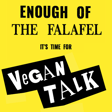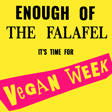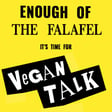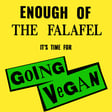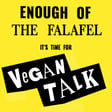
143- Could supermarkets pressure consumers to buy vegan products?
A recent study has shown that including carbon-footprint data next to supermarket products makes people significantly more likely to choose plant-based equivalents of meat, cheese and milk. Will this happen in reality, and how could other existing e-commerce tools be used to benefit animals? In this episode, Julie, Mark & Anthony examine this, as well as nine other stories from the vegan & animal rights space from the last week or so.
****************
Enough of the Falafel is a community of people who love keeping on top of the latest news in the world of veganism & animal rights. With the Vegan Week podcast, we aim to keep listeners (& ourselves) informed & up-to-date with the latest developments that affect vegans & non-human animals; giving insight, whilst staying balanced; remaining true to our vegan ethics, whilst constantly seeking to grow & develop.
Each week we look through news stories from the past 7 days in the world of veganism & animal rights.
If you spot any news stories that might catch our fancy, or have an idea for a discussion topic, get in touch via enoughofthefalafel@gmail.com.
*******************
This week's stories:
https://www.bbc.co.uk/news/articles/cz9e1jv5ewqo#:~:text=A%20member%20of%20the%20South,Magistrates%20Court%20on%203%20December.
https://www.bbc.co.uk/news/articles/c897e1jgypdo
https://www.peta.org/blog/support-research-modernization-now/
https://www.bbc.co.uk/news/articles/cn0yrd3jlgro
https://www.league.org.uk/news-and-resources/news/calls-for-devon-fox-hunt-to-stay-away-after-hounds-invade-a-conservation-project/
https://vegconomist.com/marketing-and-media/flora-gordon-ramsay-skip-the-cow-campaign/
https://www.huntsabs.org.uk/poison-traps-and-shooting-organised-crime-on-the-grouse-moors/
https://www.farminguk.com/news/concerns-raised-over-continued-fall-in-scottish-dairy-herd-numbers_66019.html
https://www.farminguk.com/news/west-midlands-person-contracts-bird-flu-on-farm_66010.html
https://vegconomist.com/studies-and-numbers/digital-nudges-in-online-grocery-shopping-promote-plant-based-choices-research-finds/.
Thursday's episode will be based upon this brilliant 75 minute audio series: https://www.bbc.co.uk/sounds/brand/m00268yv
Do check it out before the show!
****************
Thanks everyone for listening; give us a rating and drop us a message to say "hi"; it'll make our day!
Mark, Julie & Ant
